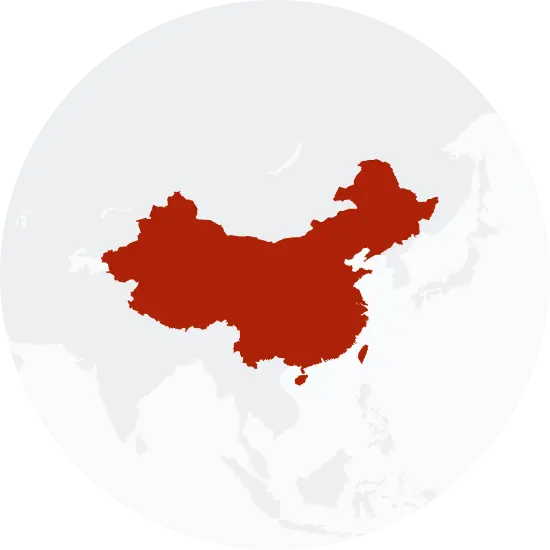Explore the Family Name Gong
How common is the last name Gong in the United States?
The surname Gong has seen a rise in popularity according to data from the Decennial U.S. Census. In 2000, Gong held the rank of 6317 among popular surnames in the U.S., and by 2010 it had climbed to the 5702nd spot, representing a 9.74% increase over the decade. The number of people with this surname also grew, with 4,967 counts in 2000 rising to 6,079 in 2010 – a significant growth of 22.39%. This resulted in an increase in the proportion of Gong per 100k people in the U.S., from 1.84 in 2000 to 2.06 in 2010.
| 2000 | 2010 | Change | |
|---|---|---|---|
| Rank | #6,317 | #5,702 | 9.74% |
| Count | 4,967 | 6,079 | 22.39% |
| Proportion per 100k | 1.84 | 2.06 | 11.96% |
Race and Ethnicity of people with the last name Gong
Regarding the ethnic identity associated with the surname Gong, the Decennial U.S. Census data shows a notable shift. The Asian/Pacific Islander representation increased from 78.18% in 2000 to 88.88% in 2010 (a 13.69% growth), affirming the surname's prevalent association with this ethnicity. Meanwhile, the percentage of individuals identifying as White dropped dramatically from 13.95% to 5.71%, a decrease of 59.07%. Those claiming two or more races also decreased from 4.09% to 3.24%. Interestingly, no one identified as Hispanic or Black with this surname in 2000, but by 2010, there was a slight representation of 1.48% identifying as Hispanic. The Black category and American Indian and Alaskan Native categories remained at 0% in both years.
| 2000 | 2010 | Change | |
|---|---|---|---|
| Asian/Pacific Islander | 78.18% | 88.88% | 13.69% |
| White | 13.95% | 5.71% | -59.07% |
| Two or More Races | 4.09% | 3.24% | -20.78% |
| Hispanic | 0% | 1.48% | 0% |
| Black | 2.38% | 0% | 0% |
| American Indian and Alaskan Native | 0% | 0% | 0% |
Gong ancestry composition
23andMe computes an ancestry breakdown for each customer. People may have ancestry from just one population or they may have ancestry from several populations. The most commonly-observed ancestry found in people with the surname Gong is Chinese, which comprises 78.0% of all ancestry found in people with the surname. The next two most common ancestries are Korean (4.0%) and British & Irish (2.8%). Additional ancestries include French & German, Chinese Dai, Vietnamese, Manchurian & Mongolian, and Japanese.
Ready to learn more about your ancestry? Get the most comprehensive ancestry breakdown on the market by taking our DNA test. Shop 23andMe
| ANCESTRY BREAKDOWN | COMPOSITION |
|---|---|
| Chinese | 78.0% |
| Korean | 4.0% |
| British & Irish | 2.8% |
| Other | 15.2% |

Possible origins of the surname Gong
Your DNA provides clues about where your recent ancestors may have lived. Having many distant relatives in the same location suggests that you may all share common ancestry there. Locations with many distant relatives can also be places where people have migrated recently, such as large cities. If a large number of individuals who share your surname have distant relatives in a specific area, it could indicate a connection between your surname and that location, stemming from either recent ancestral ties or migration.
Based on 23andMe data, people with last name Gong have recent ancestry locations all within China.
| RECENT ANCESTRY Location | Percentage |
|---|---|
| Guangdong, China | 35.00% |
| Jiangsu, China | 32.50% |
| Fujian, China | 32.50% |
| Zhejiang, China | 31.20% |
| Shandong, China | 30.80% |
What Gong haplogroups can tell you
Haplogroups are genetic population groups that share a common ancestor on either your paternal or maternal line. These paternal and maternal haplogroups shed light on your genetic ancestry and help tell the story of your family.
The top paternal haplogroup of people with the surname Gong is O-F838, which is predominantly found among people with East Asian & Indigenous American ancestry. Haplogroup O-F838 is descended from haplogroup O-M1359. Other common haplogroups include O-F8 and O-F11, which are predominantly found among people with East Asian & Indigenous American and East Asian & Indigenous American ancestry. Other surnames with similar common haplogroups are: Xu, Sun, Wang, Guo, Zhang, Wu, Li, Zhao, Zhou, Lu.
The most common maternal haplogroups of people with Gong surname are: D4a, H, D4. These most commonly trace back to individuals of East Asian & Indigenous American and European ancestry.
 Paternal Haplogroup Origins O-M1359
Paternal Haplogroup Origins O-M1359
Your paternal lineage may be linked to the Yayoi people
Historical Japanese cultures developed from two waves of people migrating from the Asian continent. Hunter-gatherers arrived in Japan more than 12,000 years ago, perhaps during the last Ice Age, when a land bridge connected Japan to the Asian mainland. This influx of people led to a culture called the Jomon. The Jomon were followed by a second migration into Japan nearly 2,300 years ago. This migration, called the Yayoi expansion, brought one lineage of haplogroup O1b to Japan, along with wet rice agriculture, weaving techniques, and metalworking technology. Research suggests that the Yayoi people were descendants of prehistoric farmers that originated in Southeast Asia, and may be associated with the origin of agriculture in the region. The transition of people in Japan from hunter-gatherers to farmers may have been triggered around 400 BC by technological developments introduced by the Yayoi people, including cold-resistant varieties of rice, iron tools, and rice field irrigation.
Your maternal lineage may be linked to the Han
Members of haplogroup D are found in both northern and southern Han Chinese populations at low to moderate frequencies. The Han people, who all share the same language and similar cultural practices, are the largest ethnic group in the world, with about 1.2 billion people. Historical evidence shows that Han people are descendants of the ancient Huaxia tribes that come from northern China, and Han language and culture only expanded into southern China in the last 2,000 years. The spread of Han people and culture from northern to southern China was likely driven by warfare and famine in the north.

What do people with the surname Gong have in common?
Spoiler alert: it's complicated. People with the same last name are usually no more genetically similar than a randomly sampled group of people from the same population. That said, people with the same surname are more likely to have similar ancestries than randomly sampled individuals. The reason is the tendency of people with similar cultural or geographical backgrounds to preferentially mate with one another. That's why people who share a surname may be more likely to share traits and tendencies in common than people within the general population. Check out the percentages below to see the prevalences of tastes, habits, and traits of people with your surname compared with prevalences among 23andMe users.
Preferences
Traits
Habits
Wellness
Are health conditions linked to the last name Gong?
The short answer is that, if there is an association between surname and health, it's usually more about your ancestry than your name. Individuals with a given surname are no more genetically similar than the general population but often have similar ancestries. The populations of people associated with those shared ancestries often have sets of genetic variations, also known as alleles, in common. Some of those alleles are associated with a greater likelihood of developing certain diseases.
Disease variant frequency by ancestry
Disease allele frequencies in populations associated with the surname Gong are shown below. Important Note: not everyone with a disease allele will develop these health condition

















